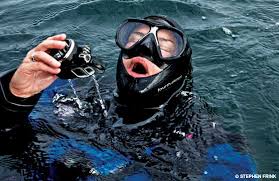WHY DIVING CAN BE EXHAUSTING?

Diving, although fascinating and rewarding, is an activity that can be physically demanding. As diving enthusiasts explore the depths of the ocean, they experience a number of factors that contribute to fatigue. Here we explore some reasons why diving can be exhausting:
1. Water resistance: Water is much denser than air, which means that each movement requires more physical effort. Divers must constantly work to counteract resistance when moving underwater, especially in current conditions.
2. Heavy equipment: Carrying the necessary diving equipment, such as the air tank, BC, wetsuit and fins, can add considerable weight. This not only increases resistance to movement, but can also cause muscle fatigue.
3. Buoyancy Control: Maintaining neutral buoyancy is crucial to the safety and comfort of the diver. Continuously adjusting the BC and the amount of air in the BC requires concentration and physical effort.
4. Mindful Breathing: Diving involves breathing through a regulator underwater, which may require slower and deeper breathing than normal breathing at the surface. This can be challenging for some divers, especially those who are still learning to regulate their breathing underwater.
5. Ambient pressure: As divers descend to greater depths, ambient pressure increases. This can cause a heavy feeling in the body and make movements difficult, requiring extra effort to move and maintain balance.
6. Environmental factors: Water conditions such as temperature, visibility and current can vary widely and affect the diving experience. Adapting to these changing conditions can be physically and mentally exhausting.
7. Emotional stress: Diving can be emotionally intense, especially for beginners or those facing challenging situations underwater, such as navigating strong currents or overcoming depth anxiety.
Despite these physical and mental challenges, many divers find that the benefits of exploring the underwater world far outweigh any fatigue experienced. The beauty and serenity of the ocean, along with the opportunity to interact with unique marine life, make diving a passion worth pursuing, even when it is physically exhausting.
1. Water resistance: Water is much denser than air, which means that each movement requires more physical effort. Divers must constantly work to counteract resistance when moving underwater, especially in current conditions.
2. Heavy equipment: Carrying the necessary diving equipment, such as the air tank, BC, wetsuit and fins, can add considerable weight. This not only increases resistance to movement, but can also cause muscle fatigue.
3. Buoyancy Control: Maintaining neutral buoyancy is crucial to the safety and comfort of the diver. Continuously adjusting the BC and the amount of air in the BC requires concentration and physical effort.
4. Mindful Breathing: Diving involves breathing through a regulator underwater, which may require slower and deeper breathing than normal breathing at the surface. This can be challenging for some divers, especially those who are still learning to regulate their breathing underwater.
5. Ambient pressure: As divers descend to greater depths, ambient pressure increases. This can cause a heavy feeling in the body and make movements difficult, requiring extra effort to move and maintain balance.
6. Environmental factors: Water conditions such as temperature, visibility and current can vary widely and affect the diving experience. Adapting to these changing conditions can be physically and mentally exhausting.
7. Emotional stress: Diving can be emotionally intense, especially for beginners or those facing challenging situations underwater, such as navigating strong currents or overcoming depth anxiety.
Despite these physical and mental challenges, many divers find that the benefits of exploring the underwater world far outweigh any fatigue experienced. The beauty and serenity of the ocean, along with the opportunity to interact with unique marine life, make diving a passion worth pursuing, even when it is physically exhausting.
